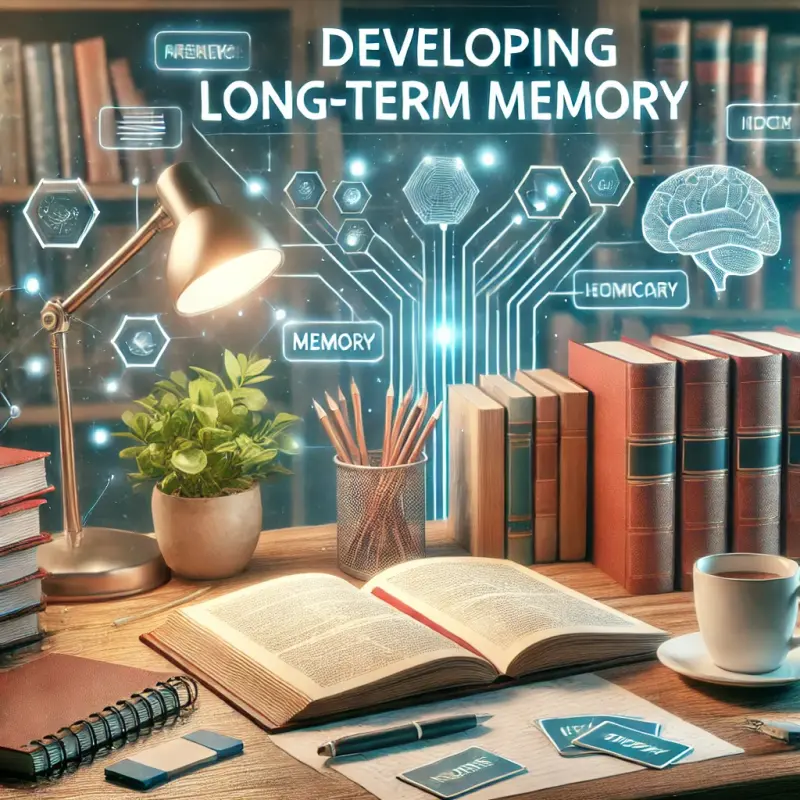How to Develop Long-Term Memory to Enhance Learning Outcomes: Exercises and Recommendations for Retention

Developing long-term memory is essential for improving academic performance and retaining information effectively. Memory is not a static function but a dynamic process that can be strengthened through various strategies and exercises. This article will explore practical methods to enhance long-term memory, focusing on exercises, techniques, and lifestyle changes that can significantly improve learning outcomes.
Understanding Long-Term Memory
Long-term memory refers to the ability to store and recall information over extended periods. It is categorized into two main types: explicit (declarative) memory, which involves facts and events, and implicit (non-declarative) memory, which involves skills and tasks. Understanding the different aspects of memory can help tailor effective strategies for improvement.
The Memory Process
The memory process can be broken down into three key stages: encoding, storage, and retrieval.
-
Encoding: This is the initial stage where information is transformed into a format suitable for storage. Effective encoding is crucial for creating strong memories.
-
Storage: After encoding, information is stored in the brain. Long-term storage is believed to involve the consolidation of memories, which can take time and is often aided by repetition and meaningful connections.
-
Retrieval: This stage involves recalling stored information. The effectiveness of retrieval can be enhanced through various techniques, including cues and context.
Strategies for Enhancing Long-Term Memory
1. Use Mnemonics
Mnemonics are memory aids that can help encode and retrieve information more efficiently. Techniques such as acronyms, rhymes, and visualization can create associations that make information easier to remember. For example, creating a sentence where the first letter of each word represents a list of items can help recall them later.
2. Practice Spaced Repetition
Spaced repetition is a learning technique that involves reviewing information at increasing intervals. This method takes advantage of the spacing effect, which states that information is better retained when study sessions are spaced out rather than crammed together. Utilizing flashcards and spaced repetition software can optimize this technique.
3. Engage in Active Learning
Active learning involves engaging with the material through discussions, teaching others, and applying knowledge in practical situations. This interactive approach fosters deeper understanding and strengthens memory retention. Participating in study groups or discussions can provide opportunities for active learning.
4. Incorporate Visual Aids
Visual aids, such as diagrams, charts, and mind maps, can enhance understanding and memory retention. Visual representations of information help create mental images that make recalling facts easier. Consider transforming notes into visual formats to reinforce learning.
5. Connect New Information to Existing Knowledge
Relating new information to something you already know can significantly enhance memory retention. This technique, known as elaborative rehearsal, encourages the brain to create connections between concepts, facilitating easier retrieval. Try to find associations or analogies that link new material to your existing knowledge base.
6. Maintain a Healthy Lifestyle
A healthy lifestyle plays a crucial role in memory function. Regular physical exercise increases blood flow to the brain, improving cognitive functions, including memory. Additionally, a balanced diet rich in antioxidants, omega-3 fatty acids, and vitamins can support brain health. Ensure you get enough sleep, as restorative sleep is vital for memory consolidation.
7. Limit Multitasking
Multitasking can hinder the encoding process, making it difficult to retain information effectively. Focus on one task at a time, allowing for deeper processing and better memory retention. By eliminating distractions, you create an optimal learning environment conducive to enhancing long-term memory.
Memory Exercises for Retention
1. Memory Games
Engage in memory games and puzzles that challenge your cognitive abilities. Activities like Sudoku, crosswords, and memory card games can strengthen your memory skills while providing enjoyable mental exercise.
2. Visualization Techniques
Practice visualization techniques by imagining the information you want to remember. For instance, if you're learning new vocabulary, visualize the word in a meaningful context. This technique enhances encoding and makes recall easier.
3. Teach What You Learn
Teaching others is one of the most effective ways to reinforce your knowledge. Explaining concepts to someone else requires you to clarify your understanding and makes the information more memorable.
4. Use Memory Palaces
The memory palace technique involves visualizing a familiar place and associating information with specific locations within that space. By mentally placing items you want to remember in different areas of the palace, you can easily recall them later by retracing your steps.
5. Regular Review Sessions
Incorporate regular review sessions into your study routine. Revisiting material periodically reinforces connections and enhances retention. Schedule time to go over previous notes and concepts to strengthen your memory.
Conclusion
Improving long-term memory requires a combination of effective strategies, exercises, and lifestyle changes. By utilizing techniques such as mnemonics, spaced repetition, active learning, and visualization, you can significantly enhance your memory retention and academic performance. Additionally, maintaining a healthy lifestyle and focusing on one task at a time will further support your cognitive abilities. Embrace these practices to transform your learning experience and achieve lasting success in your educational pursuits.
Artykuły
Zarejestruj się do naszych powiadomień, aby otrzymywać najświeższe i najbardziej interesujące artykuły bezpośrednio na swoją pocztę!